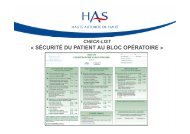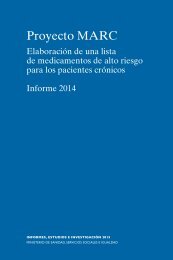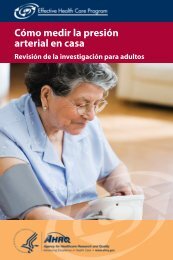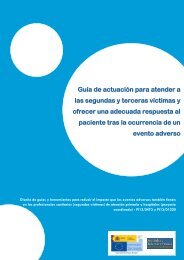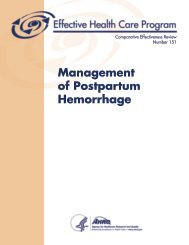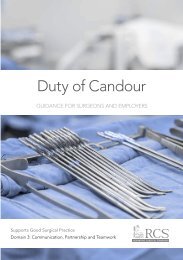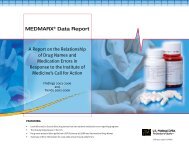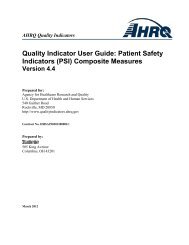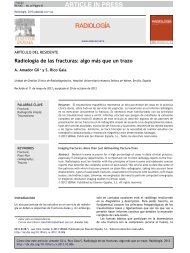for Invasive Procedures (NatSSIPs)
Z3q53
Z3q53
Create successful ePaper yourself
Turn your PDF publications into a flip-book with our unique Google optimized e-Paper software.
OFFICIAL<br />
3.2 The development of the <strong>NatSSIPs</strong><br />
Surgical Never Events and patient safety<br />
The concept of ‘Never Events’ was introduced into the UK in 2009, with a list of eight<br />
adverse patient safety events and a definition of “serious, largely preventable patient<br />
safety incidents that should not occur if the available preventative measures have<br />
been implemented”. Amongst the original eight Never Events were two of the three<br />
core surgical Never Events: wrong site surgery and retained instrument postoperation.<br />
The 2010 Never Events Framework extended the scope of the latter<br />
Never Event to include retained swabs and throat packs. A 2012 document entitled<br />
“The Never Events policy framework” added a third core surgical Never Event<br />
(wrong implant/prosthesis) and redefined the retained instrument event as<br />
“retained <strong>for</strong>eign object post-operation”.<br />
It was anticipated that the mandatory introduction of the WHO Surgical Safety<br />
Checklist in 2010 and the refinement of the three surgical Never Events would lead to<br />
a significant reduction in their incidence in the NHS in England. However, a marked<br />
decrease in these three Never Events was not seen and, in 2013, NHS England’s<br />
Surgical Services Patient Safety Expert Group commissioned a Surgical Never<br />
Events Task<strong>for</strong>ce to examine the reasons <strong>for</strong> the persistence of these patient safety<br />
incidents, and to produce a report making recommendations on how their occurrence<br />
could be minimised.<br />
The report, published in 2014 1 , advised the development of high-level national<br />
standards of operating department practice that would support all providers of NHSfunded<br />
care to develop and maintain their own, more detailed, standardised local<br />
procedures. The group tasked with creating these standards have named these<br />
National Safety Standards <strong>for</strong> <strong>Invasive</strong> <strong>Procedures</strong> (<strong>NatSSIPs</strong>) and Local Safety<br />
Standards <strong>for</strong> <strong>Invasive</strong> <strong>Procedures</strong> (LocSSIPs).<br />
This document launches the concept of national and local safety standards, and sets<br />
out their rationale and place in the continuous improvement of the safety of care <strong>for</strong><br />
patients undergoing invasive procedures. The aims of the creation of LocSSIPs are<br />
the standardisation and harmonisation of clinical practice throughout the NHS and<br />
the development of consistency in education, commissioning and regulation.<br />
Most provider organisations will already have local policies <strong>for</strong> invasive procedures<br />
that can be used as a basis <strong>for</strong> the creation of LocSSIPs that are compliant with the<br />
<strong>NatSSIPs</strong> published in this document.<br />
Never Events and the Duty of Candour – new definitions, new guidance, new<br />
legislation<br />
NHS England’s Never Events Framework is modified and updated regularly to reflect<br />
feedback from organisations reporting and investigating Never Events. The latest<br />
update, published in March 2015 3 , details the 14 current Never Events and provides<br />
the following definition:<br />
3 http://www.england.nhs.uk/ourwork/patientsafety/never-events/<br />
10



